
What is the most important resource in your life? It’s time, not money. Whether you’re a millionaire or down to your last dollar, you have only 24 hours to spend in a day. And while many factors influence the flow of money into and out of your business, when it comes to your time, you are 100% in charge, as Marcus Lemonis says.
If you are wondering how to stay on top of things, a good starting point is looking at your time management skills. You need to use your minutes and hours productively, whether at work, at home or at play. Then you can look at other areas of your life, such as organizing your desk, your laptop or your business activities.
Today, technology makes it easy to stay on top of things. There are many applications to help you track your time, money, meetings and personal priorities, such as a birthday, anniversary or an annual wellness physical. After all, Marcus Lemonis knows that you need to stay on top of your own life, as well as the people, processes and products in your business.
What Things Should You Track?
There are many things you should track in your business and personal life, including the following:

Finances
If your customers are falling behind in their payments, you would wind up with a serious cash flow problem. If you forget about a loan payment, you may have to pay a penalty. The same holds true if you run up a big balance on your business credit card or miss the deadline and have to pay a late fee.
Customers
You need to stay on top of your interactions with important clients and customers. Use your customer relationship management (CRM) system for reminders about reaching out for follow-up conversations. Make it a point to be on time for every customer call, video session or face-to-face meeting.

Employees
Are your managers, supervisors, and front-line employees focused on the right activities? Are they being productive and meeting their objectives? In the past, business owners would apply the principle of “management by walking around” to gauge the commitment of their team members. Now, you may have to apply a similar concept using video collaboration tools.
Products and Services
How are your offerings being received in your market? Is there an upward or a downward trend in sales? Staying on top of your products or services is essential to meet changing customer preferences and competitive pressures.
Personal
As an owner, it can be easy to think about your business at every waking moment. That would also be a mistake. Everyone needs downtime to recharge their mental and emotional batteries. You also need to maintain strong, positive relationships with family and friends So, do not neglect the importance of keeping track of your personal life, as well as your business activities.
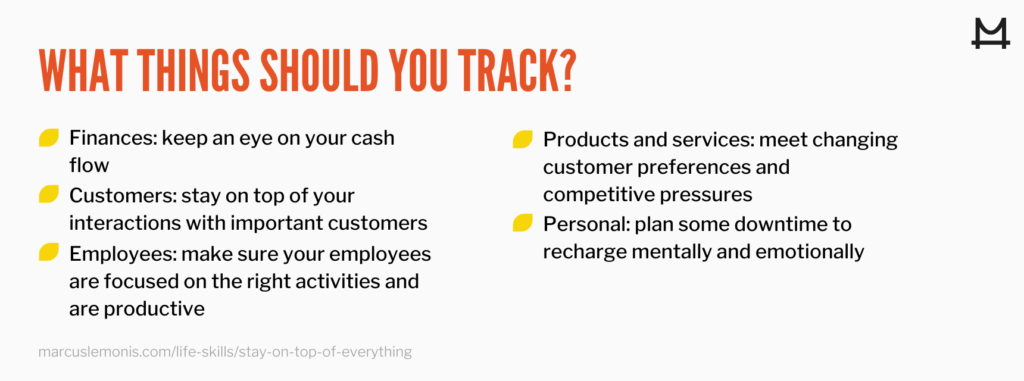
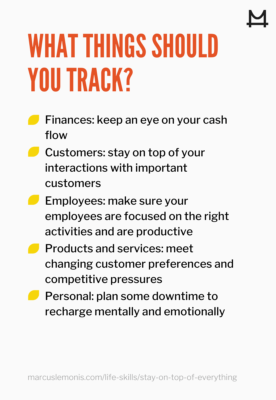
Why You Should Stay on Top of Things
It almost goes without saying that your business is headed for trouble unless you know how to stay on top of things. So, you need to set up systems and develop habits that let you identify and address issues at an early stage before they become serious problems.
For example, you need to have a solid financial accounting and tracking system. Otherwise, you could be vulnerable to downturn in revenue, an upturn in expenses or even a dishonest partner or employee stealing funds from the business. Keeping good records will also pay off when you file your taxes. For example, depending on your type of business, something simple like tracking your business mileage can give you a nice deduction on your annual return.

It’s also important to monitor your sales and service teams to see how well they are doing in bringing in new customers and retaining your existing clientele. If a salesperson is struggling to attract prospects, you can provide training and coaching support – or replace that individual with a better performer if coaching isn’t working. On the customer service side, a representative who consistently receives bad reviews or feedback may need to be moved to another position or terminated.
As an owner, you also need to stay on top of the development of new products to avoid losing precious time bringing a new offering to market. If there is a roadblock or a setback, an immediate intervention can get your team back on track.
In the press of daily activities, it can be easy to lose sight of your warehousing, inventory or delivery processes. But those problems can cripple your financial performance if they remain undetected. That’s what happened to the owner of a Georgia company that manufactured a popular outdoor consumer product. When Marcus was asked for guidance, one of the first things he noticed was the disorganized nature of the warehouse, making it difficult to find things and nearly impossible to stay on top of the inventory. Marcus made some simple suggestions, like adding more shelves and a computerized inventory system. The result: reduced waste, faster shipping and greater profitability.
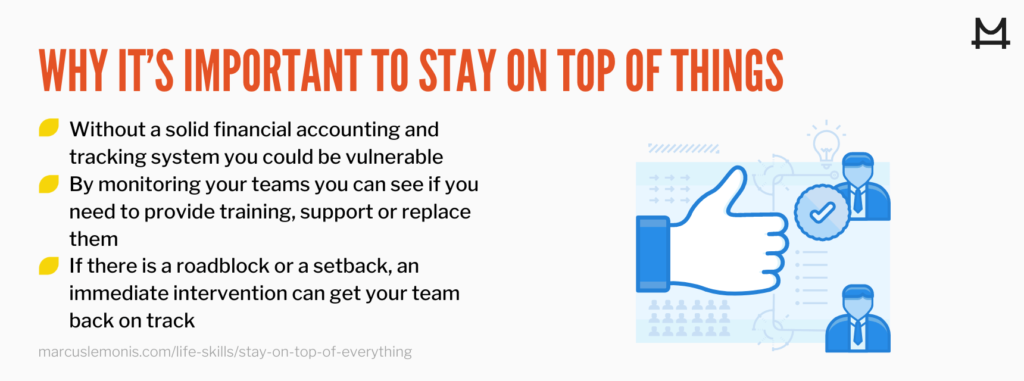
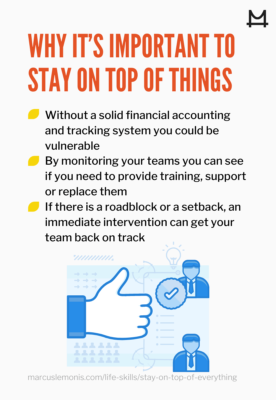
How to Stay on Top of Things
It’s all too easy to get caught up in daily problems that require your attention. But focusing on just one issue – even a major crisis – makes it tough to stay on top of other things that may be more important in the long run to the success of your business. Here are helpful tips for how to stay on top of things.
Set Your Priorities
Many owners spend a few quiet minutes early or late in the day to plan their priorities for the day, week or month. That could be anything from applying for a new bank loan, to acquiring new technology, launching a new product or recruiting a talented manager. Remember that there is a difference between what’s important and what’s urgent. If you spend each day “putting out fires,” you will find it difficult to make much progress on your top priorities.

Plan Each Day
Daily calendars, and other management tools are powerful aids for staying on top of things. Make a list of the things you need to do each day, including important deadlines and meetings. Even if you get distracted in the morning or afternoon, you can do a “reboot” by returning to your planner and focusing on the key remaining tasks.
Be Disciplined
This is an important principle for every business owner. Don’t spend an hour a day checking social media or the latest headlines. Perhaps you like to take long lunches or leave early on a Friday afternoon. That can be good for your emotional health, provided you have checked off all the important items on your daily plan.
Give Yourself Reminders
No one can remember everything you could be doing each day. So use a calendar program to set reminders for yourself. For instance, you might check on monthly sales on the 15th of each month, and compare with prior months. The same approach can help you check on your people – such as when to conduct a performance evaluation.

Delegate Responsibilities
Most owners simply do not have enough time to stay on top of everything that’s happening with work. A good solution is to delegate responsibilities. Do you really want to spend four hours a week reviewing the status of your receivables and payables? Or would your time be better spent delegating to a financial manager who can give you a status report and alert you to any problems?
Reduce Clutter
Get in the habit of cleaning clutter off your desk and your computer at least once a week. If your desk is piled high with all kinds of notes, papers and documents, you may be distracted or tempted to dive into something unimportant. You should also organize the files on your computer, such as placing them into project folders. It’s also a good idea to delete old or irrelevant emails that simply take up space.
Use Your Mobile Device Efficiently
Download applications to help you manage your business and personal life onto your smartphone, tablet or laptop. For instance, the calendar function can alert you to upcoming meetings and you can give yourself other reminders using the note-taking application.

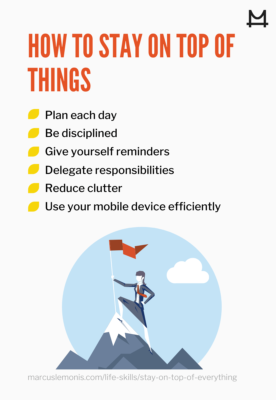
Organizing Your Life
Along with getting organized at work, you should think about how you can stay on top of things in your personal life. If an important family event is coming up, for instance, you could block out time on your daily schedule to avoid getting pulled into an unexpected business meeting. After all, most owners work to live, rather than living to work!
- What tips from above do you think can help you stay on top of things the most?
- What do you currently do to stay on top of things?





